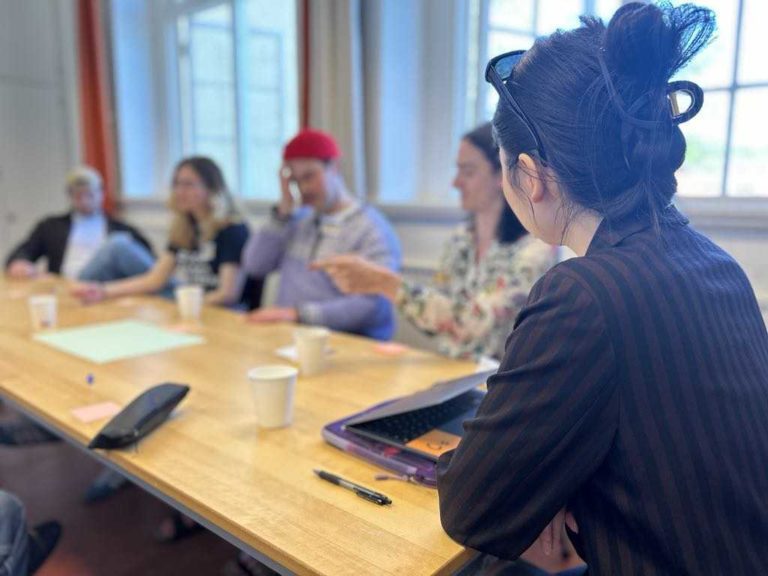Author: Eden Maclachlan & Eva Gustavfsson
Sweden and Finland’s cultural sectors are facing a crisis as severe budget cuts threaten vital support systems for emerging artists, musicians, and grassroots organisations. In Sweden, where study associations have long been a lifeline for young musicians, a reduction in government funding risks shuttering rehearsal spaces, music houses, and concert venues that nurture the next generation of artists. Finland faces similar cuts, with its already limited cultural budget slashed further as funding shifts toward defense and other priorities. Without sustained investment, these cuts could make art and music inaccessible for all but the affluent, impacting national identities and creative communities in both nations.

Antony Szmierek at Oceanen – © Eva Gustavfsson
Sweden has a dynamic local music scene and has been one of the best European music exporters internationally. On top of that, many concerts and festivals are organised throughout the country all year long. One of the reasons behind this success is the role that study associations have played in helping young Swedish musicians learn their craft and starting their musical journey while providing an arena for artists to play in front of an audience. But the recent cuts in the budget that the government allocates to the study associations could have a damaging impact on the Swedish music scene. Meanwhile, in the neighbouring Finland, culture is facing different budget cuts, which could affect the sector in a similar terrible way.
Sacrificing grassroots and learning foundations of Swedish culture
In Sweden, study associations play an important role in education alongside schools and universities. They are organisations that devote themselves to public education through the forms of activity study circles, meeting series, projects, and events whose purpose is to provide the participants with knowledge in a broad perspective. There are a total of 9 study associations scattered in more than 100 cities all across the country. A study association is financed by the State, the region, and the municipalities, with the goal of providing people with the opportunity to continue learning and developing regardless of age, background, interest, or disability and on a wide range of topics such as family support, social issues, and culture. People from different backgrounds and social classes have the possibility to meet and share knowledge and experiences making study associations a great place to promote cultural exchange and democracy.
The study associations own around 265 culture houses, more than 4 000 rehearsal spaces, and over 90 000 people have the possibility to play music, access to coaching, instruments, and courses every year. Joppe Pihlgren is operations manager at Svensk Live, a network organisation that brings together 300 event organisers and musical agencies, and sees the crucial role study associations play in developing the Swedish music scene. “It has given the opportunity to musicians to access rehearsal studios and maybe even get a small compensation when you train and develop. It is absolutely crucial because there is a lot of good music.” Being good is unfortunately not enough if there's no infrastructure that can help you to take the steps needed to develop and grow. The study associations are also important for the event organisers who can get help with rent, promotion, or equipment to put on a concert with rising acts. Without this, there are no stages to start at for up and coming artists.

Study circle session – © Eva Gustavfsson
However, since the turn of the year this foundation has started to crumble. “The major deterioration is that the study associations receive less money,” says Joppe. In 2023, the right-wing Swedish government decided to cut down on the budget allocated to study associations by 500 million Swedish Crowns (around €43,5 million) over a period of 3 years, starting in 2024. This was motivated by a shifted focus to education that leads to “real jobs”, by Minister of Education Mats Persson. To become a professional musician you however need to start somewhere. “The study associations, together with the School of Culture, are the entire base for the professional music life. After all, there is no top if there is no bottom. And here they are now starting to take away the foundation for the bottom. It is very worrying.” says Joppe. The focus of the Swedish government is that culture should strive to be self-sufficient. Minister of Culture Parisa Liljestrand says to the newspaper Dagens Nyheter that "This (the budget) is a signal that the government prioritises the cultural and creative companies in Sweden. We make it possible for cultural creators to be able to live on what they do to a greater extent.” Of course a goal for many cultural creators, but few have this luxury at the beginning of a career or in the learning phase.
And the consequences of the reduced State budget are very tangible. One of the study associations had to cease their activities altogether. Kulturens Bildningsverksamhet shut down at the turn of 2024. It consisted of six national cultural organisations such as the Chamber Music Association, Swedish Jazz, the Swedish Folk Dance Ring, and Sweden's Choral Association. Now, nine study associations remain. And needless to say, it is not going great for them. Most of them have been forced to let off staff and shrink their activities. Folkuniversitet in Gothenburg has reduced their staff by almost 30 percent and Studieförbundet Vuxenskolan have notified the Union that over a hundred employees might be let off this year. So it’s not only less money for learning it's also less employed that can help and guide you from the study associations. It also prevented the opening of a new culture house with rehearsal spaces, studio, and instrument workshops in Malmö. In the spring, ABF in the Umeå region took the decision to close down the music house in Umedalen, one of Umeå’s biggest and oldest rehearsing studios. And the list goes on.
This situation has created anxiety within the scene and musicians are being deprived of places to meet, practice, rehearse, and perform, preventing new talents from emerging and reaching out to the public. Joppe echoes this sentiment “Our biggest concert organisers are asking what are we going to put on our big stages if we don’t have grassroots stages and study associations that help to nurture and develop new musical talents. It’s the same as in football, there will be no professionals without the youth teams”. Indeed, from football to music, the same dynamic applies; New talents need an arena to practise, learn new skills, and develop before moving onto bigger stages.

Ceyda Berk Söderblom – © Margherita Caprilli
Culture Is Not a Priority in Finland
However, Sweden is not the only country in the region with a struggling cultural sector. In Finland, the new budget proposal from the government has created fear for many cultural actors and enthusiasts. “People are extremely worried about the new cuts” says Ceyda Berk-Söderblom, arts manager and Chairperson of Culture for All–a service operating nationally in the field of art and culture with the objective to offer information and support to cultural operators on questions connected with accessibility and diversity. “For 2025 the art and culture sector has received the most impressive cuts. The Culture budget has traditionally been small, and now it will be even smaller.” In Finland, culture lies under the Ministry of Education and Culture which is expected to see its budget cut by 60 million euros, with 17,3 millions being deducted from the culture budget. “We have a government who doesn’t like culture and has no understanding of art and its refinements. It shows where their priorities are.” According to the right-wing Finnish government, those cuts aim to save money and get rid of some of Finland’s debt which has been rising over the last few years. In the meantime, Finland having joined NATO in 2023 has resulted in increased investment in the military, police, security, and defense.
Therefore, art and culture are not a priority, neither in Finland nor in Sweden. But for a sector that has been hit very hard by the Covid-19 pandemic, those new cuts could have some terrible consequences. “Artists will not be able to receive enough grants to pursue their art forms and half of the independent sector might disappear” emphasise Ceyda. “Many forms of arts will be affected, but independent, free performing arts groups are especially vulnerable. Also visual artists, whose support has been small, will be hit the hardest.” In Finland, there are currently 3,3% of the employed population working within art and culture. Many could lose their jobs. “People are extremely worried about their future. There could be and will be a lot of firing,” with artists with disabilities, chronic illness, coming from minority backgrounds, and migrants being the most at risk. For individuals that moved to Finland on work-based residence permits, they might even face deportation, as a recently approved law stipulates that work-based resident permit holders need to find a new job within three months after becoming unemployed. “If people cannot have grants it will be complicated to keep your permit and justify that you have an income.” But Ceyda sees another aspect where artists will be affected too; “we talk about people who have received expensive educations and have invested in their art career and it’s not easy to change your life. There will be a lot of mental health issues since if you are not able to create and produce as a creative person it’s a pain.”
This will eventually have consequences on the overall social system as people won’t be able to attend art performances and art could become a luxury product. Ceyda advocates that a strong art and culture sector open to all is needed in Finland, “it contributes to the collective identity of the society. Culture is part of Finland’s identity and part of our international export.” In the meantime, she remains hopeful that the tide will turn. “Finland is a very well educated country and whatever the government is doing right now it can be fixed. But it will impact society in the long run. Culture creates memories and people can be attached to it. So we are taking away those memories from the new generations.” While in Sweden, if the budget to study associations does not increase, the future of the Swedish music scene could look bleak and playing music might become an activity reserved for a specific social class–playing music and starting a band will only be reserved to the more well off. In the meantime, Joppe and Svensk Live are working and hope to find a solution; “We are looking for new financing models. It is our most important focus right now.” More and more, independence and alliances with like-minded local authorities seem to be the way forward to preserve creative freedom.
References
Rebecka Gordan, "Rekordlåg kulturbudget – igen" (Record low culture budget - again), MagasinK, September 20th, 2023
"Basen i svenskt musikliv. Rapport" (The basis of Swedish music life. Report), Studieforbunden
Torun Boucher, "Kulturen ska inte betala regeringens nedskärningar" (Culture should not pay for government cuts), ETC, October 26th, 2023
Kristoffer Törnmalm & Moa Lindstedt, "Regeringen drar ner på anslag till studieförbund: 'Prioriterar'" (Government cuts funding to study associations: ‘Prioritising’), SVT, September 20th, 2023
Ceyda Berk-Söderblom, Rita Paqvalén & Sari Salovaara, "Kulturens betydelse i dessa kristider" (The importance of culture in these times of crisis), Hufvudstadsbladet, August 15th, 2024
"Severe cuts proposed to arts and culture funding", Frame, August 13th, 2024
Published on November 12th, 2024
About the authors:
Eden Maclachlan is a project manager for Studentradion i Sverige and an editor for K103 Gothenburg Student Radio.
Eva Gustavfsson is the station manager at K103 Gothenburg Student Radio. She has been producing radio and media content since the teens.